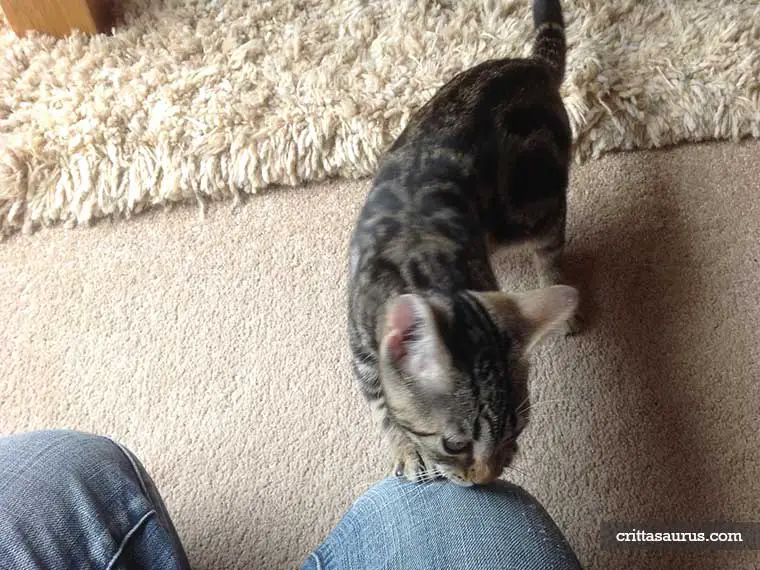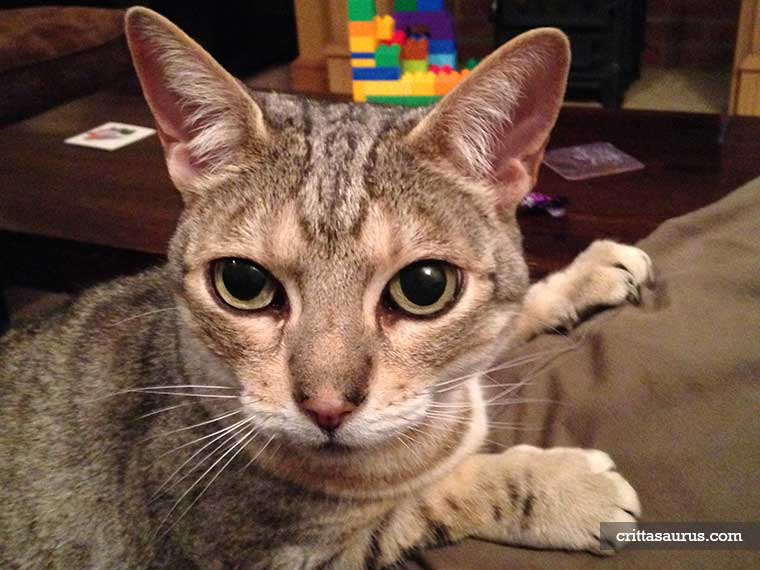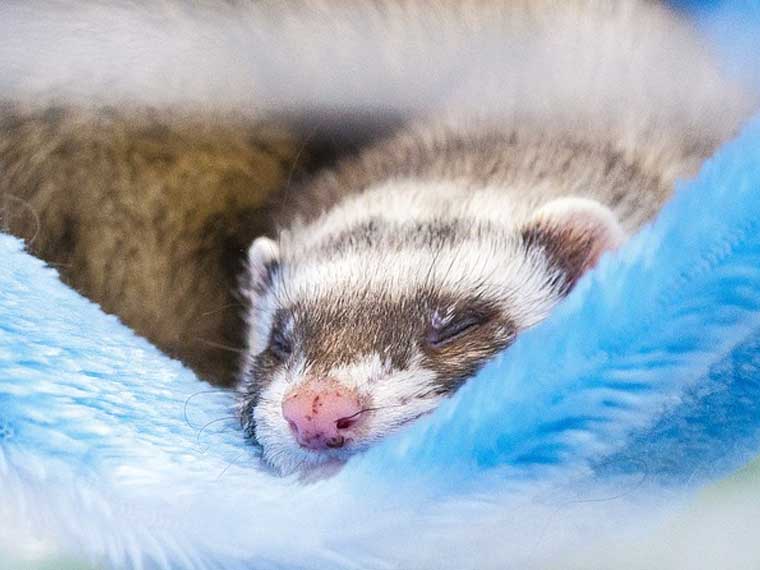Owning two entirely different species of pet, no matter how similar they might appear on the face it, will often come with challenges. Cats and ferrets are two such pets. Whilst you might think that cats and ferrets can get along, don’t put them together without reading this guide first.
I will explain how ferrets can be ok with cats, but with some caveats, including how you can introduce the two species. Often ferrets do mix well with cats, but as you can imagine it’s often down to the two creatures as individuals.
Do ferrets get along with cats?
Despite their appearance, ferrets are not rodents. If they were, it’s unlikely that ferrets and cats could be friends. Ferrets are part of the weasel family and share many characteristics with cats.
Because of this, there are many examples where ferrets do get along with cats, and happily live together under the same roof. Just one YouTube search will show you how ferrets and cats can be friends.
How well do ferrets and cats get along?
But don’t let that video lull you into a false sense of security. Whilst many ferrets and cats can get along, it’s down to the cat and ferret as individuals, plus how the owner has introduced them.
If you are worried and concerned, then you’re right to be. Not all ferrets and cats can live together, but to stand the best chance, you need to understand their similarities and differences first.
Can ferrets and cats live together?
In most cases, cats and ferrets can live together without problems. However, there are several factors that can contribute to a more successful cohabitation to ensure they get along and become friends.
- Care needs to be taken with their introduction
- Each animal needs to be given enough individual time and space
- Facilities, such as food and litter boxes should be kept separate
- Cats and ferrets share most of the same diseases but may cause each other unfamiliar health problems.
Similarities between the species
Ferrets are related to polecats, so that should give a clue as to their compatibility. Both cats and ferrets are natural hunters, obligate carnivores and crepuscular. This means that they are both primarily meat eaters that are most active around dawn and dusk.
Both cats and ferrets are curious and like to climb, and they can both be trained to use litter boxes.
But… this is where the similarities end.

How to make ferrets and cats get along?
Here’s my guide which explains how to introduce a cat to a ferret to ensure they most peaceful outcome… and hopefully the start of a beautiful relationship where the ferret and cat can live together.
How to introduce a cat to a ferret
Great care needs to be taken when introducing your ferret and cat to each other. The process needs to be supervised and done over a period of days, with some distance or barriers between the animals initially.
Firstly, introduce the cat to the ferret while the ferret is in the cage, allowing the animals to get used to each other’s scents. A further step would be to have the ferret on a lead in the company of the cat.
If there are no problems, you can proceed to allow them to be together in the same space, while you monitor their interaction. Create escape routes for both species, e.g., a tube for the ferret and high ground for the cat.
Once you are satisfied that they are compatible, you can leave them on their own together.

Issues that might prevents ferrets and cats getting along
Age
You will have greater success if one of the species is a young animal and is able to adapt to the habits of the other. You also do not want there to be too great an age gap between the animals. While one will want to play, the other might prefer to rest.
Personality
Ferrets are renowned as being sociable and affectionate animals while cats have a reputation for being aloof, and often downright disdainful. However, individuals within the species also develop their own character traits.
Even within species, it makes sense to match temperaments. This holds true when your aim is to have different species share the same space.
Be especially vigilant for signs of dominance. Female ferrets tend to dominate their male counterparts, regardless of whether they have been spayed or not. Be aware of how tolerant the cat is of this behavior.
Number of animals
If you have one cat and one ferret, this will be easier to manage than multiples of one or both. Both species are courageous, but they may be overwhelmed if outnumbered. Monitor the situation to prevent rough play, perceived aggression, and dominance.
History of the animals
If your ferret is not young and has lived elsewhere before you acquire it, you need to understand what its living conditions were.
For example, were there other ferrets or other pets; was it allowed to roam free or was it confined to a cage. These factors will contribute to its behaviour towards you and your other pets.
Likewise, if the cat you’re introducing is feral or has been used to living in a barn, it may have problems adjusting to your home, let alone another species.
Body language
Initially, a cat may consider the ferret to be prey because of its smaller size and erratic movements. But when the ferret does not behave like prey and back down when confronted, the cat will soon learn that it is not an easy meal.
Your ferret will probably be the one to initiate play which your cat could interpret as aggression.
Cats are more inclined to avoid and ignore irritations and move off. Cats hiss and lash out with their paws if they are annoyed or threatened.
A ferret will nip or bite. They also have long claws which could do damage. Step in quickly when you see tempers rising.
Ferrets are attracted by warmth and may like to cuddle up with your cat and burrow into its fur. This will no doubt take your cat by surprise at first, but if they bond, the cat will soon be grooming its new friend to sleep.

Neutering
Intact males and females of either species could cause complications when they need to cohabit. Raging hormones could make the animal aggressive and territorial.
Most ferrets are neutered before they are sold. This is done when the animal is very young and has been known to cause health problems later in their lives.
Cat owners and their consulting vets tend to wait until the animal is older before desexing it. Keep an eye out for behavioural changes resulting from hormonal development, and have the cat neutered as soon as possible, to keep the peace.
Living space
For your pets to live together in harmony, you need to cater for their individual needs, and give them opportunities to escape from each other.
Ferrets need an escape-proof and ferret-proof environment so that they do not go missing or get into danger. The likelihood of them returning if they get out of their living quarters, is remote.
Cats have nine lives and do not need as much nurturing. They will also reliably return home, after a night out.
Sleeping arrangements
Ferrets spend a great deal of time sleeping, and will find their own dark, hiding places to do so. You will need to purchase a ferret cage, if you spend time away from home and feel a need to know where your pet will be when you return. They will also need fleece blankets or hammocks to simulate the darkness of their natural environments.
Although cats know how to make themselves comfortable, they can fall asleep on a beam in a barn.

Feeding areas
Both animals are obligate carnivores, which means that they require at least 70% of their diets to be protein, preferably meat. Ferrets, however, have a more finely tuned digestive system and cannot tolerate grains or starches to the same extent as cats can.
To avoid health problems and possible food aggression, it is advisable to keep their food separate.
Litter boxes
Your ferret will need a litter box for each living area (which will stink by the way, here’s how to stop it), whereas a cat will require only one and may even have access to an outside area where it can do its business.
Cats tend to bury their waste while ferrets just make deposits and leave. The cat litter therefore needs to be deeper than that of the ferret.
The latter also backs up and sprays and has a tendency to dig in the litter box if it finds anything foreign or mildly interesting. These hygiene habits are not compatible, so it is best to provide separate conveniences.
Commercially available cat litter may not suit ferrets. They prefer more natural substances like wood chip or pine needles. Alternatively, you can use training pads for the ferret which can be folded to protect your walls and skirting boards.
All litter boxes need to be refreshed at least once a day. If either animal is dissatisfied with their ablution facilities, they will choose their own spots which will add to your work load and discomfort.
As you can see by now, it’s going to cost a bit to keep a ferret alongside your cat.
What can prevent ferrets and cats getting along?
Injuries while fighting
If your pets should become hostile towards each other, they may cause severe harm. Cats tend to fight by ambushing and going in for the kill with one meaningful bite. They also have a weight advantage.
Consensus is, however, that the cat will have only one chance to do the ferret in. Thereafter, it becomes a sworn enemy as ferrets never forget.
Ferrets are known to punch above their weight. Their tactics include nipping and tearing any parts of the body that protrude, such as your cat’s ears. They also aim for the back of the neck with their teeth, and then twist their opponent, much like an alligator would.
Ferrets have thick skin which would be difficult for a cat to penetrate. Cats have relatively thin skin which will most likely become infected from a ferret bite.
Diseases and other issues
Cats and ferrets share many of the same diseases, skin fungi, parasites, and bacteria. These include rabies and influenza, although ferrets are affected less by the latter. They both can get ringworms, mange, salmonella and Pasteurella.
Vaccinations and a generally robust immune system can keep these at bay.
Unvaccinated cats may pose an additional danger in that they can carry the parasite, Toxoplasmosis, which can be fatal to ferrets. It is transmitted through the cat’s faeces which is another reason to keep their litter trays separate.
If your cat and ferret bond successfully, your cat may spend a fair amount of time grooming the ferret. This could result in hairballs which often result in problems in the digestive tract.
Further details on cats and ferrets living together
There are some other commonly asked questions I’ve seen online from people wanting to keep both species. Just for interest, but you might be asking the same.
Can ferrets and cats mate?
As crazy as this sounds, I saw someone asking can ferrets and cats have babies in a Facebook group. The answer is of course, no.
But you might find either one of the two might try and mate with the other if they have been left intact.
Do ferrets kill cats?
It’s unlikely that a ferret will kill a cat. Perhaps a ferret could kill a kitten, but the odds woud be stacked against in a fight to the death with an adult cat. The cat will have a weight and size advantage over the ferret.
Whilst the ferret can give a nasty nip to a cat, the cat would soon gain the upper hand and win any battle.
Handy Hint: Here’s the truth about eagles being able to pick up cats and take them off as prey. You might be surprised.
Are ferrets afraid of cats?
If the ferret has never met a cat before and they have not been introduced properly, then they could be afraid of a cat, particularly if the cat goes to attack the ferret. It’s why slow and sure introductions are so important for them living together and getting along.
What pets can live with ferrets?
The best pets to live with ferrets are dogs and cats, which have been proven to get along. Of course, the best solution could be that you buy a pair of ferrets, instead of introducing another species.
However, do not mix birds or rodents with ferrets. The ferret is likely to prey on them, as he would in the wild.
Handy Hint: I’ve also written a guide showing how to introduce a ferret to a dog.
Conclusion
Providing you exercise caution, ferrets and cats will get along and can live together. However, it’s not to be taken for granted, as even after a safe introduction, there could be two who simply won’t mix well and become friends.
You might also like…
- Listen to all the strange noises a ferret will make
- How long ferrets can go without eating
- The reality of ferret smells stinking out your house
Cat image in header via https://pixabay.com/photos/cat-kitten-pet-lick-tongue-6723256/

